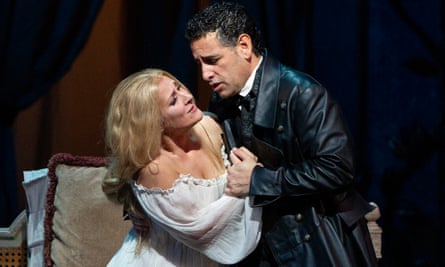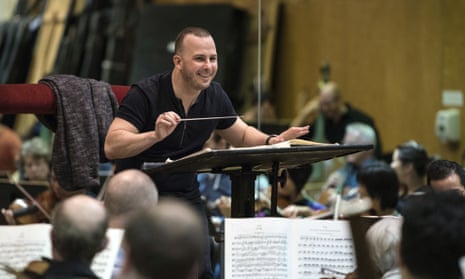In the late 1990s the Canadian conductor Yannick Nézet-Séguin, spending a weekend in New York City, found himself one afternoon “just wandering towards” the Upper West Side. He was with his partner, the Canadian violist Pierre Tourville, walking up Broadway. They turned a corner and “there it was”, he recalls, “the plaza and the fountain and the arches of the Met. Pierre said to me: ‘One day it’s going to be your house,’ and we sort of laughed. I must have been 22. But it wasn’t something that was so out of the question that it couldn’t be a dream. And here we are all this time later and it’s happened.”
Nézet-Séguin, now 43, officially took over as music director of the Metropolitan opera house in August. Earlier this week he was in the pit for his first production in post, a new La Traviata, starring Diana Damrau and Juan Diego Flórez, which will be streamed worldwide as part of the Met’s Live in HD cinema serieson 15 December. His arrival comes at a crucial moment for the organisation. The Met, not alone among major opera houses, is wrestling with the perennial problems of finance and audience emerging from the tension of having to balance the preferences of its traditional subscribers – older, richer, more conservative in their tastes – with the need to encourage a new generation. In recent years the house has also attracted protests against a controversial production of John Adams’s The Death of Klinghoffer and endured protracted backstage labour disputes with craft unions. The popular line was that there was as much action off stage as on. “But of course everything is dramatic,” laughs Nézet-Séguin. “It’s opera!”
However, there has also been a darker issue hanging over the house. Last year allegations emerged that James Levine, music director for more than 40 years, had been sexually abusive towards younger artists over whom he had authority. The Met severed all ties with Levine, who denies the allegations. Nézet-Séguin, who was due to take over from Levine in 2020, was asked if he would bring forward his start date. “Yes there is some anxiety around taking up the post early,” he admits. “But we’ve been talking and planning things for a while so stepping up a little sooner than anticipated – albeit in unhappy circumstances – also feels liberating and very exciting.”

He gives every impression of being the breath of fresh air sought by the Met: relaxed and approachable, he is the antithesis of the cliched grand maestro of old. He is also hugely respected as a musician who is comfortable with the core repertoire as well as willing to try something new. And he has a track record of dealing with challenges. Something of a prodigy – he says he realised he wanted to be a conductor when he was 10 – Nézet-Séguin founded his own professional ensemble in Montreal when he was only 20. “We had almost no money and made the scores ourselves by cutting up photocopies of sheet music.” A move to the Orchestre Métropolitain came at a time when people were questioning whether the city needed another orchestra alongside the Montreal Symphony. “We managed to persuade them that we were worth it.” His arrival at the Philadelphia Orchestra – historically one of the most renowned in the world and where he has a contract until 2026 – coincided with the orchestra filing for bankruptcy. “Everyone in the city would say how proud they were of the orchestra. But then I asked them when was the last time they actually went to a concert. Our task was clear.”
Early announcements since Nézet-Séguin’s arrival at the Met do point to new ways of doing things. Most notably the first female composers have been commissioned, including Missy Mazzoli who will write a new opera based on George Saunders’s Man Booker winning novel Lincoln in the Bardo. Another contemporary literary adaptation will be of Michael Chabon’s The Amazing Adventures of Kavalier & Clay. Star director Ivo van Hove has been invited in to direct several new productions and there will be collaborations with other arts institutions around New York.
“It will always be a wonderful pilgrimage to go to the Met, it’s a unique place and new audiences as well as our regulars will always love this type of glamour,” Nézet-Séguin explains. “But we also need to go out to the people, both physically in new venues and in cinemas, and through our work.” He says of the new commissions that an audience should be able to better identify with “both the storyline and the viewpoint from which it is told. It’s undoubtedly true that many of the operas we present are not from a varied point of view. It is mostly white males. I think it is important that a place like the Met should help influence a shift not only to more female composers, but also composers of different communities and cultural backgrounds. And these announcements are just the tip of the iceberg. There are many more projects in the works.”
Despite the challenges, Nézet-Séguin predicts that opera as an art form will become increasingly desirable. “People are worried about shortened attention spans. I myself get frustrated if a page on my phone takes two seconds to load. And everywhere people are trying to counter this. You hear about retreats and yoga and so on, in a way you wouldn’t have 20 years ago.” He observes with interest a perceived search for the more substantial, for authenticity and excellence. “There are different ways of trying to find a place to reconnect with who we are, and the scale and depth of grand opera, almost by definition, gives you time for words and thoughts and music to sink in. It allows you to reflect because the great composers have made it that way.” The analogue attraction of the acoustic sound of voices and instruments in a digital world also exerts a potentially strong allure. “That quintessential human experience of opera will always have enormous value.”
Nézet-Séguin is using rehearsals for La Traviata as a way not only to connect with the audience, but to help the players, too. “Traviata is one of the four or five most perfect operas. It has just the right proportions, dramatic arc and equation between music and action.” He compares working on it to rehearsing Beethoven’s Fifth. “Everyone knows it inside out by heart, so I took the opportunity not to reteach it, but for us all, together, to step back and reconsider it. What does it mean when there is a dot on a note or why a quarter note versus an eighth note? Why did Verdi choose this orchestration?”
The exercise, alongside the announcements about new initiatives and repertoire, also feeds in to a wider healing process within the Met after the recent upheavals. “I want there to be an appreciation that there is a joy to making music. It is certainly important and can be a serious business. But ultimately we must never forget that it is a source of joy.” He sees his role as being to set a new direction for the future while “maintaining the musical standards that have been our trademark in the past. And that’s a never-ending journey in that you start afresh every morning with a piece of music which presents new possibilities. Even Traviata. The rehearsals have been fascinating and I stopped to talk much more than usual. For everyone it became a way of reassessing our style for the years to come.
“It is a masterpiece that will always be a masterpiece, but as we worked on it every day it also felt like a new beginning”
